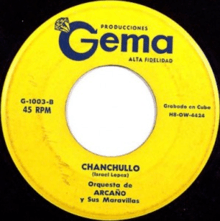Chanchullo
| "Chanchullo" | |
|---|---|
 | |
| Single by Orquesta de Arcaño y sus Maravillas | |
| A-side | "El que sabe, sabe" |
| Released | 1957 |
| Format | 7" 45-RPM |
| Recorded | 1957 |
| Genre | Cuban danzón-mambo |
| Label | Gema |
| Songwriter(s) | Israel "Cachao" López |
"Chanchullo" (Spanish pronunciation: [tʃaɲ.ˈtʃu.jo]; literally: "scam", "racket", "hustle") is a Cuban danzón-mambo. It was written by Israel "Cachao" López and recorded in 1957 by Arcaño y sus Maravillas.
Origins and writing
In his book Mambo Kingdom, Max Salazar wrote: "In late 1936, "Cachao" López was introduced to Antonio Arcaño [...] By now, "Cachao" was composing and arranging music. The idea of the mambo was audible in his bass lines; "Reza del Meletón" is a good example. [...] In 1957 the Arcaño orchestra recorded "Meletón" for the Gema label under the title "Chanchullo". (In 1963, Tito Puente built on the tune's introduction to compose "Oye Como Va")."[1]:178 When asked whether he would sue for his rightful share of the royalties, the notoriously humble "Cachao" is said to have shrugged and said: "You know how kids are."[2]
Personnel
- Antonio Arcaño – leader
- Israel "Cachao" López – musical director, bass
- Eulogio Ortiz – flute, soloist
- Orestes López – piano
- Ernesto Duarte – writer
Cover versions
Discogs and Allmusic list cover versions by several performers:
- Tito Puente, on the album Mucho Cha-Cha (1959)[3]
- Gilberto Cruz, on the album Chanchullo (1971)[4]
- Típica '73, on the album Charangueando Con La Tipica 73 (1980)[5]
- Fania All-Stars, on the album Greatest Hits (1992)[6]
- Olavo Alen Rodriguez Son Ensemble Nos Naranjos, on the album From Afrocuban Music to Salsa (1999)[7]
- Rubén González, on the album Chanchullo (2000)[8]
- Joaquín J. Oliveros, on the album De Bala (2000)[9]
- Somos Amigos, on the album Imagínate Cuba (2005)[10]
- Charanga Tropical on the album Live! (2006)[11]
- Buena Vista Social Club, on the album At Carnegie Hall (Live) (2008)
- Cuba Jazz Millennium All Stars, on the album Tributo a Arsenio, Chano Pozo y los Clásicos (2008)[12]
- Al De Lory, on the album Hot Gandinga (2009)[13]
References
- ↑ Salazar, Max (2002). "Chapter 28: Two Centuries of Charanga". Mambo Kingdom - Latin Music in New York. New York: Schirmer Trade Books. ISBN 0-8256-7277-5.
- ↑ Holley, Jr., Eugene (September 21, 2010). "Cachao: Uno Mas". allaboutjazz.com. All About Jazz. Retrieved 18 February 2017.
- ↑ "Tito Puente And His Orchestra – Mucho Cha-Cha". discogs.com. 1959. Retrieved 9 February 2017.
- ↑ "Gilberto Cruz – Chanchullo". discogs.com. 1971. Retrieved 9 February 2017.
- ↑ "Tipica '73 – Charangueando Con La Tipica 73". allmusic.com. 1980. Retrieved 9 February 2017.
- ↑ "Fania All-Stars – Greatest Hits". allmusic.com. 1992. Retrieved 9 February 2017.
- ↑ "Olavo Alen Rodriguez – From Afrocuban Music to Salsa". allmusic.com. August 10, 1999. Retrieved 9 February 2017.
- ↑ "Rubén González – Chanchullo". allmusic.com. September 19, 2000. Retrieved 9 February 2017.
- ↑ "Joaquín J. Oliveros – De Bala". allmusic.com. October 3, 2000. Retrieved 9 February 2017.
- ↑ "Somos Amigos – Imagínate Cuba". allmusic.com. March 8, 2005. Retrieved 10 February 2017.
- ↑ "Charanga Tropical – Live!". allmusic.com. October 25, 2006. Retrieved 9 February 2017.
- ↑ "Cuba Jazz Millennium All Stars – Tributo a Arsenio, Chano Pozo y los Clásicos". discogs.com. 2008. Retrieved 10 February 2017.
- ↑ " Al DeLory – Hot Gandinga". allmusic.com. 2009. Retrieved 10 February 2017.
External links
- "chanchullo traducción. Diccionario Español-Inglés". diccionario.reverso.net.
- "El que sabe, sabe/Chanchullo". rateyourmusic.com. 1957.